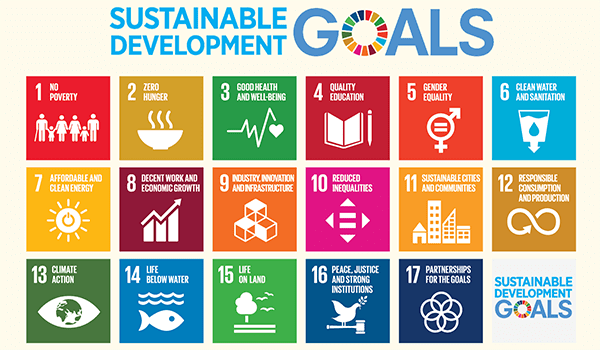The Sustainable Development Goals were put into action by the United Nations in 2015 to improve living standards worldwide.
The SDGs take a big-picture view of economic development. They cover everything from food production to energy use, human wellbeing to the health of our cities.
This means the SDGs are paramount to any discussion of global food systems and anchor Global Table’s programming.

What are the Sustainable Development Goals?
The SDGs are the world’s roadmap towards achieving a reduction in poverty by 2030, without costing the earth. There are 17 goals addressing global challenges such as eliminating hunger to ensuring the health of our oceans.
The SDGs were developed by the United Nations through nearly seven million submissions from the public and consultation with representatives from 70 countries. Australia was one of 193 countries who agreed to the goals and made a commitment to achieve the targets by 2030.
Why do we need them?
The problems identified by the SDGs are complex. Many of them have been on the global agenda for decades. For example, 10% of the world’s population still live in extreme poverty, despite huge reductions made since 1990.
The SDGs unite the world around achieving solutions to these problems.
The SDGs are also a safeguard for the future. They put clear actions around issues such as climate change, unsustainable farming practices, education for girls, packaging waste and more.
Today, these issues are informing everything from government policy to customer decisions. This has huge implications for business.
How you can see the SDGs in action at Global Table
Our food systems significantly affect climate, energy and other areas covered by several of the SDGs. Therefore, the Goals must lead any discussion of the future of these industries.
To date, there has been no large-scale public event in Australia that puts all of the Sustainable Development Goals in the spotlight, as well as Australia’s actions towards achieving them.
This is where Global Table and Seeds&Chips – The Global Food Innovation Summit have a role to play.
The SDGs anchor Global Table’s programming and purpose, with a focus on the following goals:
- Goal 2: Zero Hunger
- Goal 3: Good Health and Well-being
- Goal 6: Clean Water and Sanitation
- Goal 7: Affordable and Clean Energy
- Goal 11: Sustainable Cities and Communities
- Goal 12: Responsible Consumption and Production
- Goal 13: Climate Action
- Goal 14: Life Below Water
- Goal 15: Life On Land
With a 2030 target for the goals, the time is now to put the SDGs on the agenda for Australia and the Asia-Pacific region.